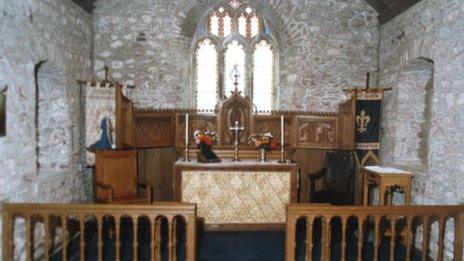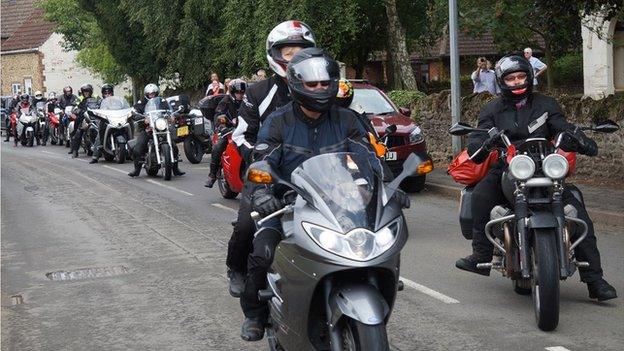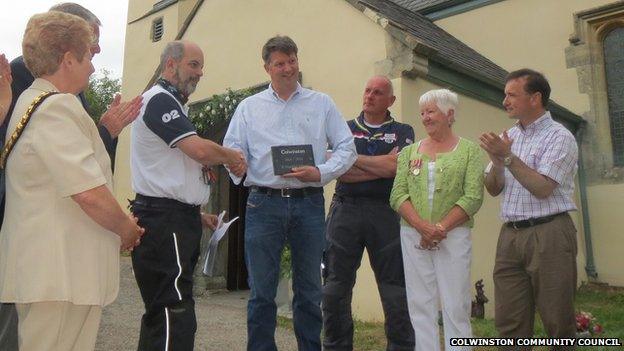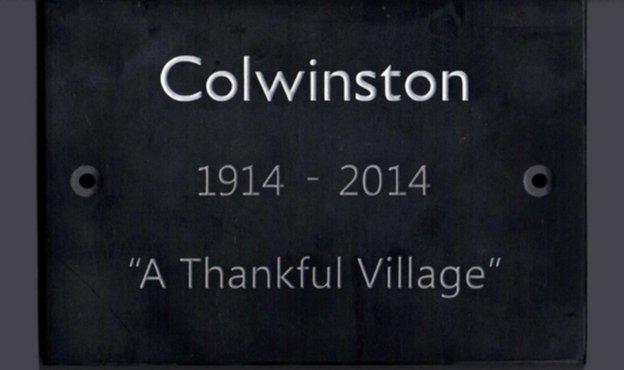'Thankful villages' of WW1 acknowledge their good fortune
- Published
Medwyn Parry presented a plaque to villagers after he and Dougie Bancroft (left) reached Colwinston, Vale of Glamorgan on Saturday
Colwinston near Cowbridge, Llanfihangel y Creuddyn on the outskirts of Aberystwyth, and Herbrandston - just a stone's throw from the port of Milford Haven - are all archetypal picture-postcard rural Welsh villages.
Yet keen-eyed visitors may spot that something is missing from all three - none have the obligatory memorial to the fallen of World War One.
The reason is that they are Wales' only "thankful villages".
Of more than 1,000 Welsh parishes who sent men to the front, only these three saw all of their sons return home safely.
Indeed, Herbrandston is doubly thankful, as it alone in Wales lost no men in either world war.
Across 16,000 parishes in England and Wales, just 53 are thankful villages, of whom only 14 are said to be doubly thankful.
There are none in Scotland or Ireland, and only one in the whole of France.
Last year Medwyn Parry and his hardy companions set about touring all 53 thankful villages by motorbike to raise money for the Royal British Legion.
Even though he now lives just a few miles from Ceredigion's thankful village of Llanfihangel y Creuddyn, Mr Parry explained that his fascination began in another of those rarest of places.
"Decades ago I was doing some work in Colwinston. I can't remember whether I'd already noticed that they had no war memorial, but one day it started teeming down and we went into the porch of the local church to shelter," he said.
"I saw the plaque there listing the men who went to the Great War and giving thanks for the fact that they all came home alive.
"It struck me as incredibly unusual at the time, but it was only with the arrival of the internet that I started doing some research and realised just how unusual it was."
As part of the motorcycle tour, Mr Parry's group presented each village with a slate plaque to commemorate their good fortune and to mark a spot at which to remember those places which were not as lucky.
"I found around Llanfihangel that some people knew it was a thankful village but didn't really know what that meant, and that others had wondered why we went to the neighbouring village on Remembrance Sunday but hadn't thought any more about it than that," he said.
"But once people know the significance they're immensely proud of their history. So we thought we'd like each of the thankful villages to have a plaque which would act as a talking point.
"The fact that this handful of parishes lost no-one focuses your mind on the sheer scale of the carnage elsewhere."
Llanfihangel y Creuddyn welcomed home 12 men in 1918, Colwinston 23, and Herbrandston 32, as well as another 39 in World War Two.
All three had populations under 200, and had stood to lose the heart of a generation.

A triptych (three-section screen) at St Mary's Church in Herbrandston was paid for by parishioners thankful of the men's return
BBC Historian Dan Snow contends that their salvation is all the more miraculous given the system of battalions of "pals", which saw entire villages, factories and football teams patriotically sign up together, and often die together.
"It was a pattern repeated many times - and on each occasion, a town or village was deeply wounded, instantly," he said.
The pals' system was phased out in 1917, but not before it left an indelible mark on the British consciousness.
"They had to stop that practice because it was so unbelievably destructive," said Snow, whose great-grandfather Sir Thomas D'Oyly Snow was a general at the Somme.
"When you let brothers serve together, it can be devastating for a whole community. It was a war that touched everybody in the British Isles. That's what total war means."

Medwyn Parry and his companions visited all 53 'thankful villages'

The people of Colwinston receive their 'thankful' village plaque

The thankful villages have been given a plaque to serve as a talking point
However Geoff Bates, chair of Colwinston Community Council, wonders whether this same destructive system could in a bizarre way be responsible for the thankful villages as well.
"Part of the work we're undertaking for our centenary commemorations is to try and learn more about these 23 men - who they were, what they did etc," he said.
"At the moment it's not clear if they served together in a pals' battalion and were extremely lucky to have been posted to a part of the line which saw comparatively light losses, or whether they were dotted all over and the fact that they all came home is just an incredible random chance.
"Depending on what we find, we're hoping to put on an exhibition of their lives on the anniversary in August."
Colwinston has also secured a grant from Vale of Glamorgan council for new road signs indicating their thankful village status.
But Colin Reynolds, a member of the church council of St Mary's in Herbrandston, says that when they realised there were no village losses after World War Two as well, the villagers were not entirely sure whether they should be advertising the fact.
"After the first war a local landowner, whose son was one of the 32 to come home safely, gave thanks by paying for the church to be re-pointed. He also donated the wonderful screen we have behind the altar," he said.
"When the same happened in the second war the local gentry bought the church a pipe organ. That drew a lot of attention because there weren't many churches around here with pipe organs, but by all accounts nobody in the village knew quite how they should feel.
"There were six churches on the local circuit and the other five all lost many, many men.
"So how could St Mary's celebrate all their sons returning safely, and show off their new organ, when everywhere else you looked people were mourning?"
- Published27 July 2013
- Published26 February 2014
- Published27 July 2013
- Published11 November 2011